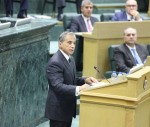You are here
Investing in achievement, not pedigree
Sep 10,2017 - Last updated at Sep 10,2017
One of the highlights of my morning on September 4, the day after the week without newspapers, the Eid holiday, was to reach for my Jordan Times.
My attention was immediately captured by the headline “Addressing campus violence remains unfinished business as debate goes on” atop a photo of a group of men with their faces concealed by balaclavas and armed with makeshift clubs, obviously bent on mayhem.
I searched the Internet for this debate and found that there was very little of it, save for two studies published back in 2014. They were alarming nevertheless.
One, by the Jordan Political Science Association, was titled “University Violence by Numbers”. Its author, Mahmoud Al Jundi, stated that in the period 2010-2013 there were 296 fights involving 3,999 mainly male Jordanian students.
Firearms were used on 58 different occasions. Seven students were killed in these fights 31 sustained severe injuries, and many more suffered lesser injuries.
The study also said that that tribalism was the principal feature of these fights.
The other publication was a seminar report by the Konrad-Adenauer-Stiftung, titled “Violence at Jordanian Universities: Reasons and Solutions”. It was equally not rich in analysis, but it made the point that sanctions taken against violent students are often dropped thanks to the ubiquitous wasta.
This was distressing because university is where youth launch their mind into the universe, not incarcerate it in a cocoon of tribalism.
My despondency on reading these reports was somewhat soothed by the news on the same day that a Jordanian team, Farah Salah and Khaled Al Sharif, graduates from Princess Sumaya University and the Jordan University, in partnership with a team from the US, came first out of 21 international teams in NASA’s Europa Challenge 2017.
Their winning app enables scientists and researchers to display accurately in 3D, real-time data of Earth’s atmospheric conditions from multiple data sources. This allows us to have a comprehensive view of the changes occurring to the Earth’s climate.
The juxtaposition of these two news items highlights the challenge that faces Jordanian universities, and Jordan as a nation: how to channel the energy of our youth constructively.
Undergraduate years are a very sensitive period. People at that age are energetic, motivated, susceptible, impetuous, creative and passionate. In a healthy environment, undergraduates experiment with their first taste of adulthood: they mobilise behind every cause imaginable, join civil society organisations and try out different political ideologies. They want to make the world a better place.
To help make the world a better place is what Salah and Al Sharif did. This is why they should become role models for Jordanian youth.
The challenge facing Jordan is how to universalise their example.
A corollary challenge is how to prevent the quest for excellence from feeding the brain drain, i.e., how to retain high achievers in this country. The only way anyone anywhere ever achieved this objective was through meritocracy. Who knows, it may be worth a try.












